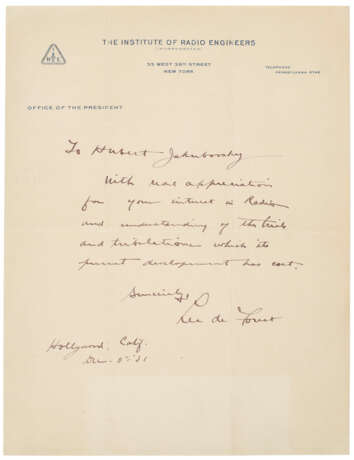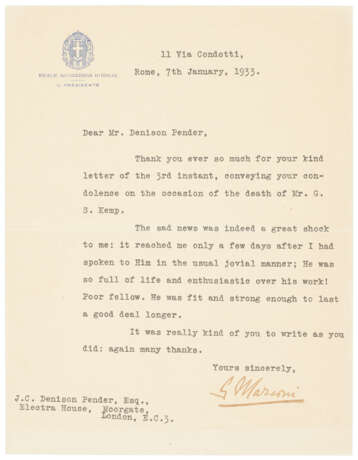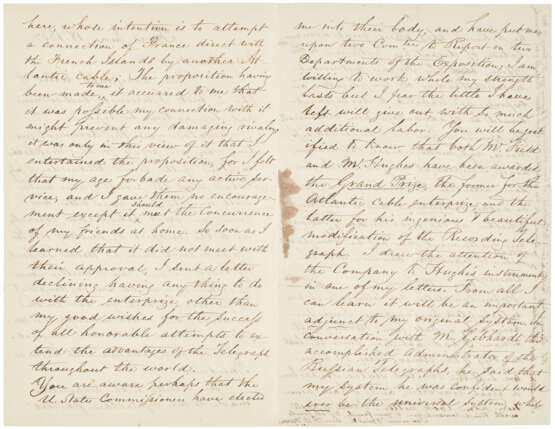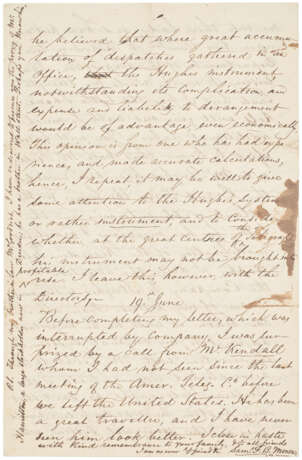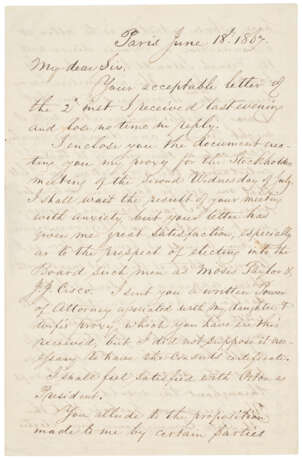ID 1129685
Lot 67 | On the spread of telegraphy across the world
Estimate value
$ 2 000 – 3 000
Four pages, bifolium, 207 x 134mm, (light ink show-through, a few ink stains on final page).
Morse praises the "honorable attempts to extend the advantage of the Telegraph throughout the world", as well as a new telegraph system competing with his own. Morse first forwards a document appointing his correspondent as his proxy for an upcoming stockholders meeting for the Western Union Telegraph Company, stating he would be pleased to elect Moses Taylor and J.J. Cisco as board members and select William Orton as president. He then discusses an attempt to connect the telegraph cables of France and the French islands, which he initially endorsed. Yet once he learned of his peers objections to the project, he "sent a letter declining having anything to do with the enterprise, other than my good wishes for the success of all honorable attempts to extend the advantages of the Telegraph throughout the world." Thereafter, Morse mentions Cyrus W. Field's reception of the grand prize of the International Exposition for the "Atlantic cable enterprise" – the first telegraph cable to be laid across the Atlantic, which Morse supported. He then notably mentions David Edward Hughes's recent "ingenious & beautiful modification of the Recording Telegraph", which was the first telegraph system to print the text at both the sending and receiving ends and thus do away with the need for the "Morse code" required via Morse's system. Of this discovery, Morse describes it "an important adjunct to my original system" and states that the administrator of the Russian Telegraph "said that my system would ever be the universal system, while he [also] believed that where great accumulation of dispatches gathered...the Hughes instrument, notwithstanding its complication...would be of advantage, even economically..." and recommends the directors to consider whether "his instrument may not be brought into profitable rise". The Hughes system eventually did overtake Morse's to become the adopted standard across Europe, though it faced considerably less success with the American market.
[With:] EDISON, Thomas (1847-1931). Typed letter signed ("Thos. A Edison") to Rear Admiral George E. Byrd of the U.S. Navy Yard, Orange, 2 November 1918. One page, quarto, on his laboratory letterhead (two small splits along right edge, uneven toning at bottom). Edison requests the loan of a boat from the U.S. Navy for experiments on a listening device. In response to prior correspondence forwarded to him, Edison thanks Burd for enclosing a blue print of the proposed vessel, then certifies that "this boat is all right…shall I keep the blue print or return it?" With two retained copies of related correspondence. Since at least 1917, Edison had been working with the U.S. Navy on a "sea anchor" that would enable a merchant vessel to turn quickly and avoid torpedoes during World War I. However, a report from Edison to the Naval Secretary, dated 13 June 13 1919, mentions a listening device attached to the bow of a merchant ship that could detect torpedoes from a distance of four thousand yards. * MARCONI, Guglielmo (1874-1937). Typed letter signed ("G Marconi") to J. C. Denison Pender, Rome, 7 January 1933. One page, bifolium, octavo, on President of the Royal Academy of Italy letterhead. Marconi grieves the death of his former assistant and fellow pioneer of wireless communication, George S. Kemp who worked closely on his efforts to prefect wireless radio transmissions. After thanking Pender for sending his condolences, Marconi mentions the sad news of Kemp's passing came as great shock: "It reached me only a few days after I had spoken to Him in the usual jovial manner; He was so full of life and enthusiastic over his work! Poor fellow. He was fit and strong enough to last a good deal longer." * DE FOREST, Lee (1873-1961). Autograph letter signed ("Lee de Forest") to Hubert Jakubovsky, Hollywood, Calif., 5 December 1931. One page, quarto, on Institute of Radio Engineers letterhead. (light mailing folds impacting signature, unevenly toned at bottom). Sending appreciation for his correspondent's interest in radio and "understanding of the trials and tribulations which its present development has cost".
| Artist: | Samuel Finley Breese Morse (1791 - 1872) |
|---|---|
| Auction house category: | Letters, documents and manuscripts, Medicine & science |
| Artist: | Samuel Finley Breese Morse (1791 - 1872) |
|---|---|
| Auction house category: | Letters, documents and manuscripts, Medicine & science |
| Address of auction |
CHRISTIE'S 20 Rockefeller Plaza 10020 New York USA | ||||||||||||||
|---|---|---|---|---|---|---|---|---|---|---|---|---|---|---|---|
| Preview |
| ||||||||||||||
| Phone | +1 212 636 2000 | ||||||||||||||
| Fax | +1 212 636 4930 | ||||||||||||||
| Conditions of purchase | Conditions of purchase | ||||||||||||||
| Shipping |
Postal service Courier service pickup by yourself | ||||||||||||||
| Payment methods |
Wire Transfer | ||||||||||||||
| Business hours | Business hours
|

